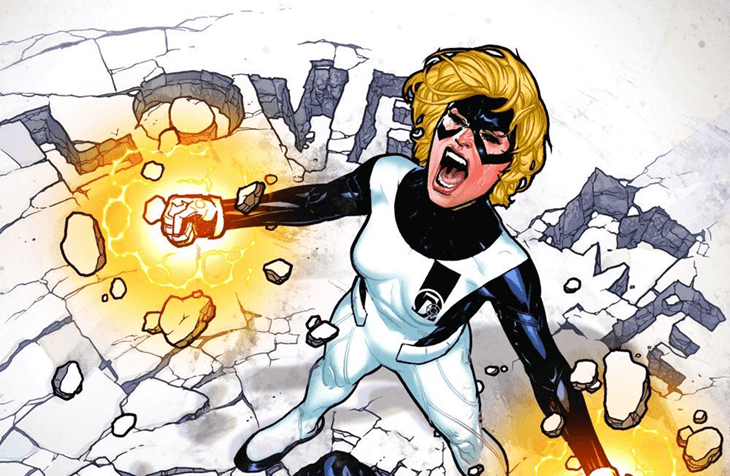Content Warning: This essay contains frank discussions of fictional sexual abuse against a minor.
Even non-comic fans recognize Tara Markov, AKA Terra. While not one of the five Teen Titans most commonly seen on the small screen, she is perhaps one of the most recognizable members of their supporting cast. Introduced in the December 1982 issue of the New Teen Titans—which was, notably, a collaboration between DC Comics and the National Runaway Association—Tara is most recognizable due to her associations with the men and boys around her. The illegitimate daughter of the king of a small fictional European nation, Tara and her older half-brother, Brion Markov/Geo-Force, gained their powers as part of a genetic experiment. As the apprentice of Slade Wilson/Deathstroke the Terminator, she joined the New Teen Titans as a double agent in order to fulfill the Judas Contract, a hit put out by the cult leader Brother Blood to ensure the team’s death and destruction. For around twenty-six years Tara served the role of primary love interest to Gar Logan/Beast Boy. As suggested by the events of Blackest Night in 2008, her betrayal was more traumatic to Gar than the sudden loss of his parents.
Prior to the events of the Judas Contract, betrayal of this nature was not yet commonplace in the superhero genre. In the words of Identity Crisis writer Brad Meltzer, who was twelve at the time of Tara’s introduction, “Sure, there were always heroes who were later revealed as villains. At Marvel, the Avengers did it every week. […] But the end of those stories was always the same: the so-called ‘villain’ […] came to their senses and saved the day. In Terra’s case, however…this girl didn’t just infiltrate the Titans—she really wanted to kill them. And best of all, as the months wore on, Wolfman and Pérez never backed away from the decision. Indeed, issue after issue, they kept turning up the despicable meter on Terra’s actions. By the time they were done, Terra wasn’t just working with Deathstroke, she was sleeping with him.”
This is where the morality of Tara and Slade’s relationship extends past the comic book realms of good and evil. Slade was sixteen when he lied about his age to join the U.S. Army. By the time of the Suez Crisis, he had been promoted to the rank of sergeant, a promotion which requires a minimum of thirty-six months of service to be granted. This means that Slade was at least nineteen years old in 1956. Conversely, Tara was born in 1968, having celebrated her sixteenth birthday on May 12, 1984 with her fellow Titans. Tara is a trained mercenary, yes, but the precocious maturity of a teenage vigilante can hardly lessen an age gap of around thirty-one years—especially when Slade had fathered two of his three children by the time she was born.
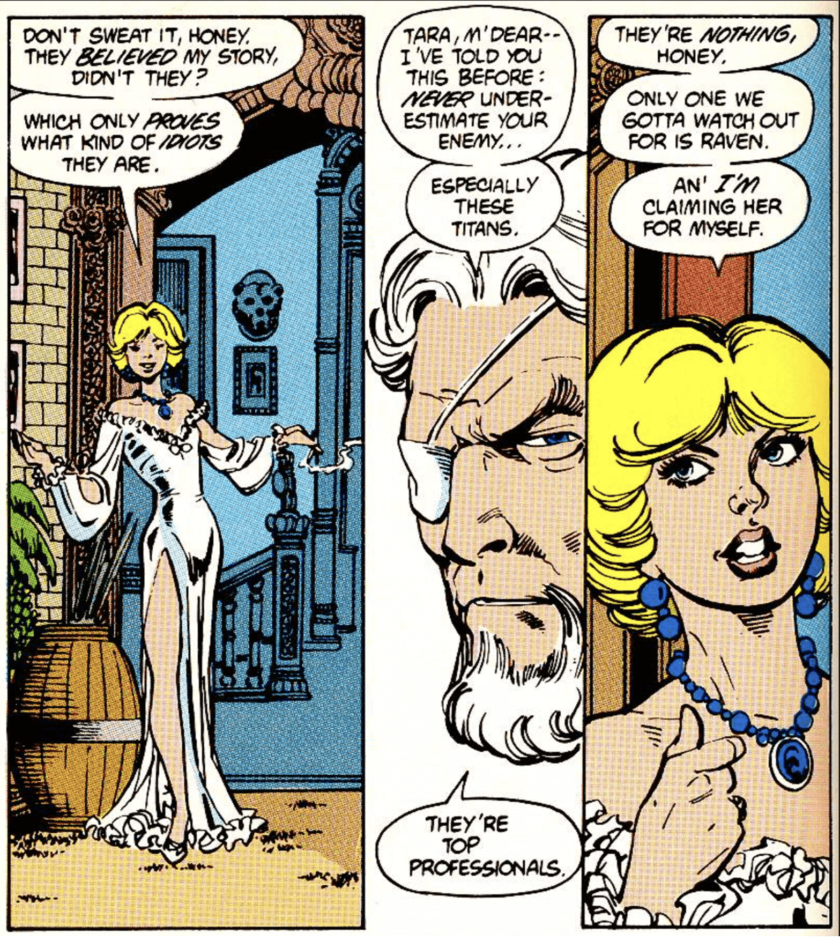
The sexual nature of their relationship is treated almost as an extension of Tara’s betrayal. Compared to the visual appearance of her modest Titans outfit, the contrast is startling. Tara’s sexuality is virtually linked to her immorality, and this artistic distinction is deliberate. In a 2007 interview, Judas Contract co-writer and artist George Pérez described the intentionality of Tara’s sexualization, “I wanted her to be cute, but not beautiful. She looked like a young girl. I gave her a very substantial overbite, her eyes were wide, her body was slim, she wasn’t particularly busty. I wanted her to look almost elfin, so that when you see her for the first time wearing full makeup and dressed in a provocative outfit where you know she’s just been in bed with Deathstroke that it does jab you a bit. ‘Whoa, good God! This little girl is a slut!’” Yet, only paragraphs before this, Pérez acknowledged Tara’s victimhood in this situation, “One of the primary things was that we had Deathstroke the Terminator have an affair with a minor—this is statutory rape—and the fact that she is so sociopathic. Since we knew we were planning to kill her and have her meet her deserved end, we didn’t worry about what kind of moral lesson it was. She was going to be punished. Anyone who thought after seeing how truly bad she was that we would find a way of redeeming her was being a little naïve. We wanted her to be as much a viper in the garden as we could.”
At the end of the Judas Contract storyline, Tara confronts Slade in Brother Blood’s lair between rounds of battle with the Titans and Slade’s estranged seventeen-year-old son, Joey Wilson/Jericho. “I heard you callin’ to your kid, beggin’ ’im to help you. You’ve gone soft and old—and useless,” Tara claims with an accusing pointed finger. “You know the only reason I joined you, Slade—an’ it wasn’t ’cause we were lovers.” Within pages of this confrontation, Tara commits suicide. Overcome by emotions and a sense of betrayal, she tears down the walls around her and kills herself under a self-imposed avalanche. As the narrator tells us, “Her name is Tara Markov and she is little more than sixteen years old. And due to the fault of no one but herself, she is insane. No one taught her to hate, yet she hates…without cause, without reason. No one taught her to destroy, yet she destroys…with glee, with relish. Don’t look for reasons which do not exist—plainly, Tara Markov is what she is. And she has taken a great power and made it as corrupt as she is. She could have dammed raging rivers and funneled water to lands parched, dry, and dead. Her powers were limited only by the mind which controlled them. A mind which sought not hope…not love…not life…but death. And she found death. But not her enemies’. Her own.”
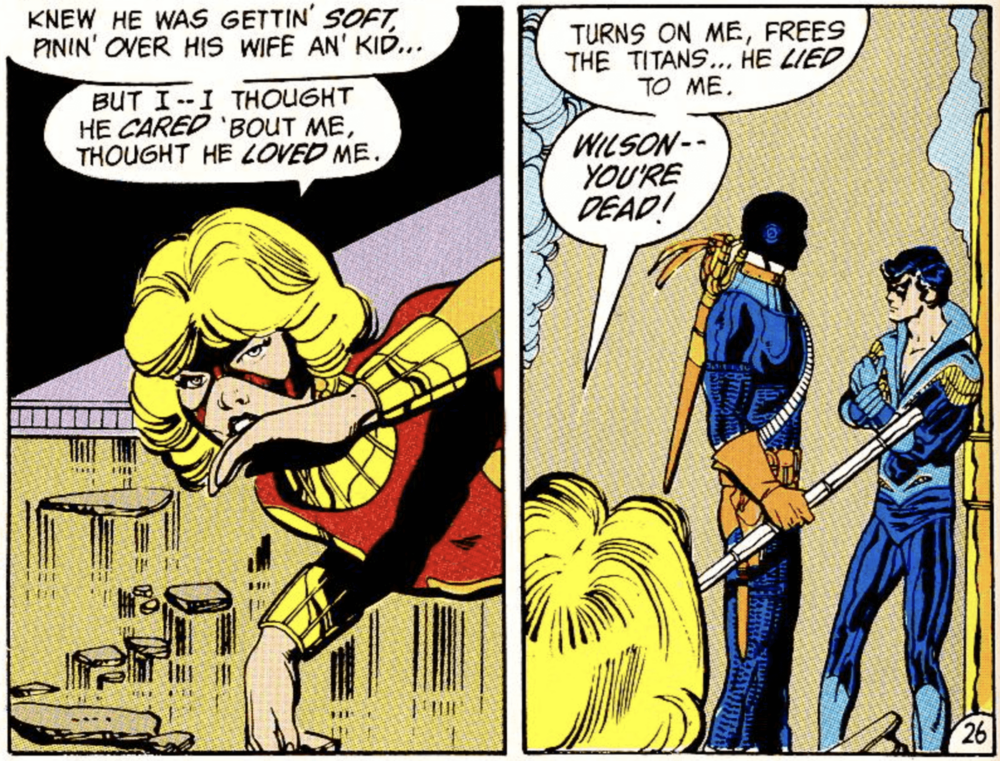
Three issues after Tara’s funeral, Cyborg comforts an emotional, grieving Gar Logan with a promise: “The Terminator will pay for his crimes.” Six more issues pass before Slade is arrested and brought into custody—albeit on a completely different charge. Slade Wilson is found not guilty of kidnapping television host Samuel Abrams, because there’s no way to definitely prove that he was the one operating under the alias of Deathstroke the Terminator. This verdict is no doubt aided by Gar’s attempt to murder him in cold blood while the trial is still in session. Slade’s booked on the much lesser charge of illegal firearm possession and escorted straight to prison. After the trial, Gar makes a vow to himself: “Prison or no—I swear the Terminator’s a dead man. Dead!”
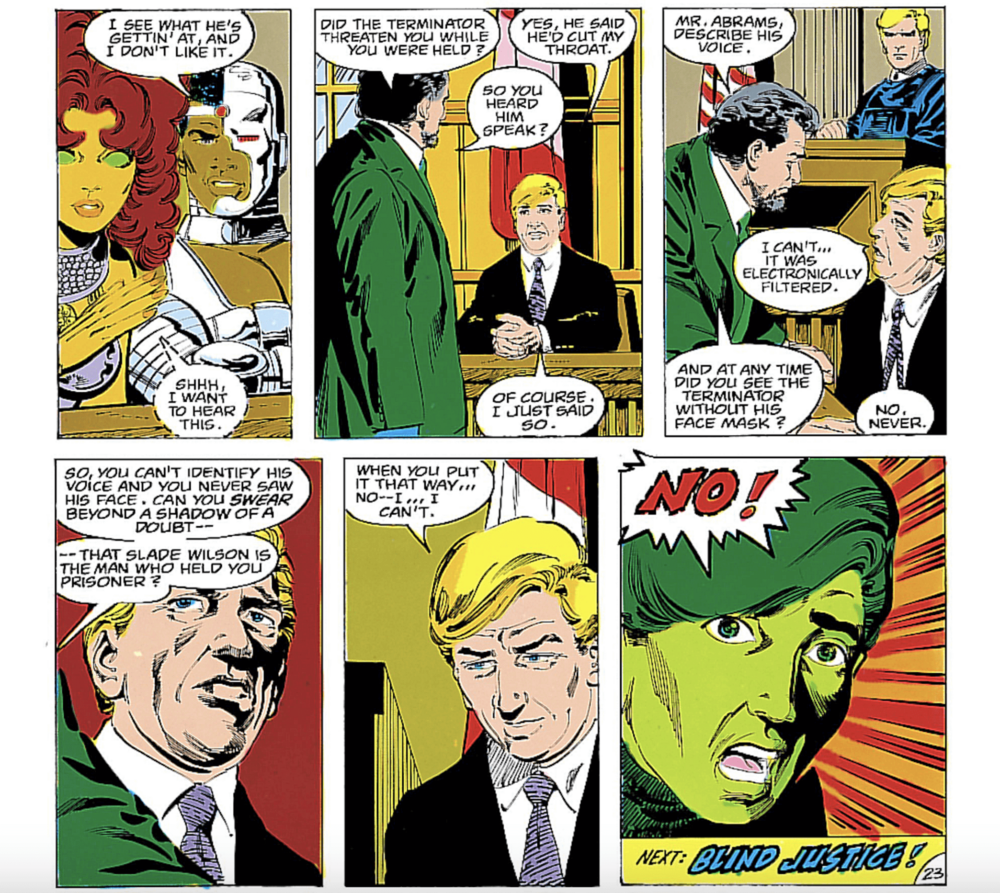
In the next issue, Gar has what can only be described as a mental breakdown. In attempting to murder Slade in prison, he succeeds only in breaking him out. They meet in the wilderness to fight, but Gar breaks down in tears before Slade can make the first move. This brings about an honest diner conversation, where the two converse man to man. “You’re not an idiot, Logan. Maybe you’re covering up for [Tara] because you refuse to believe she fooled you…but you know better,” Slade tells Gar. “She used me and I used her. If she didn’t die trying to kill both of us, she would have died doing something else. She was a sad case…and she carried a chip on her shoulder the size of Mount Everest. So, she took on this job in Africa, became friendly with the king, and joined his family. Only he was smart. He saw her for what she was and tried to get rid of her, but she killed him first.” This African king? The man who looked after Gar after his parents died doing medical research in the fictional country of Lamumba. Slade crafts a tale painting Tara as a fille fatale who seduced and manipulated both Gar and himself, introducing a façade of unlikely kinship between the two. It’s the Humbert Humbert defense: She seduced me. Gar takes this entire story at face value. Heartbroken and defeated, he asks Slade one last question: “Slade…did you ever make love to Tara?” Slade assesses him for a moment before deflecting. “Would that make any difference?” he asks. Gar holds his face in his hands. “I…I guess not.” With Slade’s exit from the diner, a chapter closes on Tara’s story. Her backstory will not be revisited again for another thirty-two years.
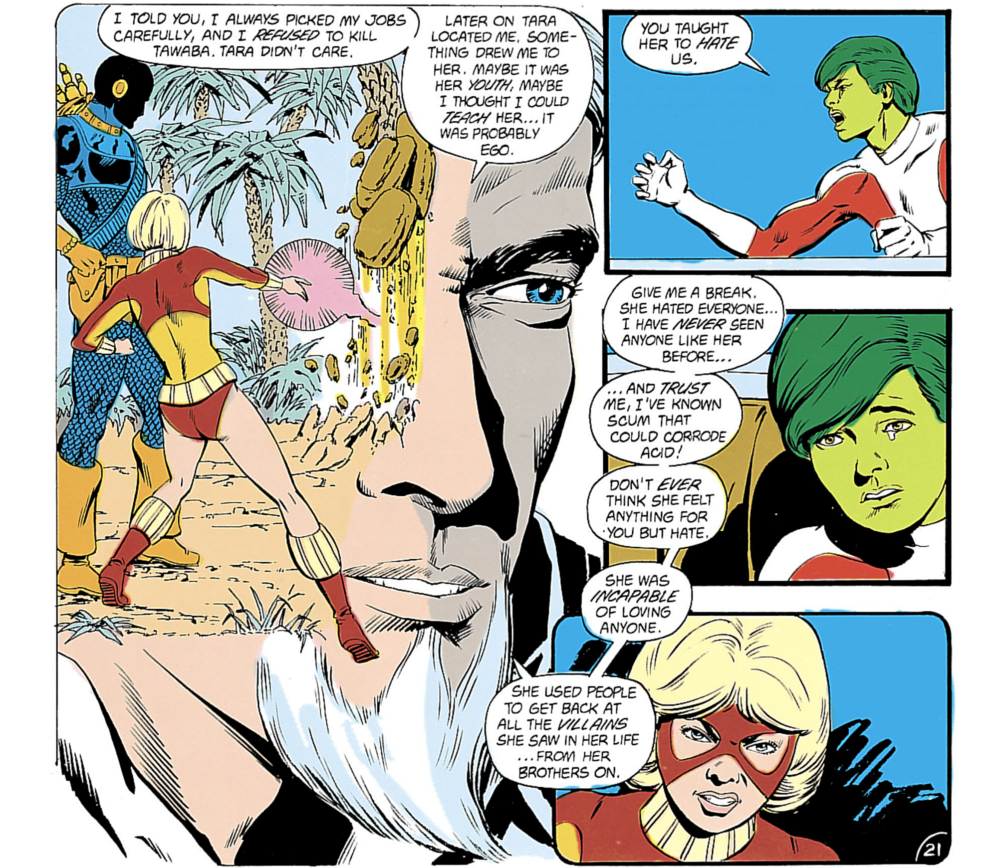
In issues twenty-seven and twenty-eight of the 2016 Deathstroke Rebirth series, critically acclaimed writer Christopher Priest focuses primarily on Slade’s previous relationship with Tara, who trained under him at seventeen before failing the Judas Contract mission and going into escort work alone as a young adult. (Notably, seventeen is the age of consent in New York City, where the events of Judas Contract took place.) Priest’s entire run is focused predominantly on Slade’s relationship with his family. His questionable decisions are at the forefront of all the interpersonal conflict which surrounds his career as a middle-aged assassin and former United States military soldier and experiment. In flashbacks, he gets into physical altercations with his wife, beats his sons, abandons his daughter, and is indirectly responsible for the death of his eldest son and the physical muteness of his second.
In the present, he feuds constantly with his ex-wife, has an affair with his living son’s fiancée, and has a life-changing experience during a battle which causes him to repent and seek a better path—for all of ten issues. It’s his ex-wife Adeline who initiates Tara into the Titans ripoff, Defiance, which Slade is founding. Adeline believes that Tara’s history with Slade will make her an eager and willing accomplice in a mission meant to destroy him and Defiance. These plans are thwarted in issue twenty-eight, when Slade dismisses Tara’s presence with a confession that has been almost a decade in the making. “I never loved you, Tara,” he tells her with his back turned as he walks in the opposite direction. “Years ago…you were just a child. I took advantage of you. It was wrong.” This revelation should bring about a moment of catharsis for Tara, but writer Priest makes it clear that their relationship was never sexual in this continuity. In fact, in a flashback scene where Tara is waiting naked for him in his bed, Slade throws her clothes at her and tells her off for her attempts at seduction. “I’m not one of your marks. Just stick to the plan.”
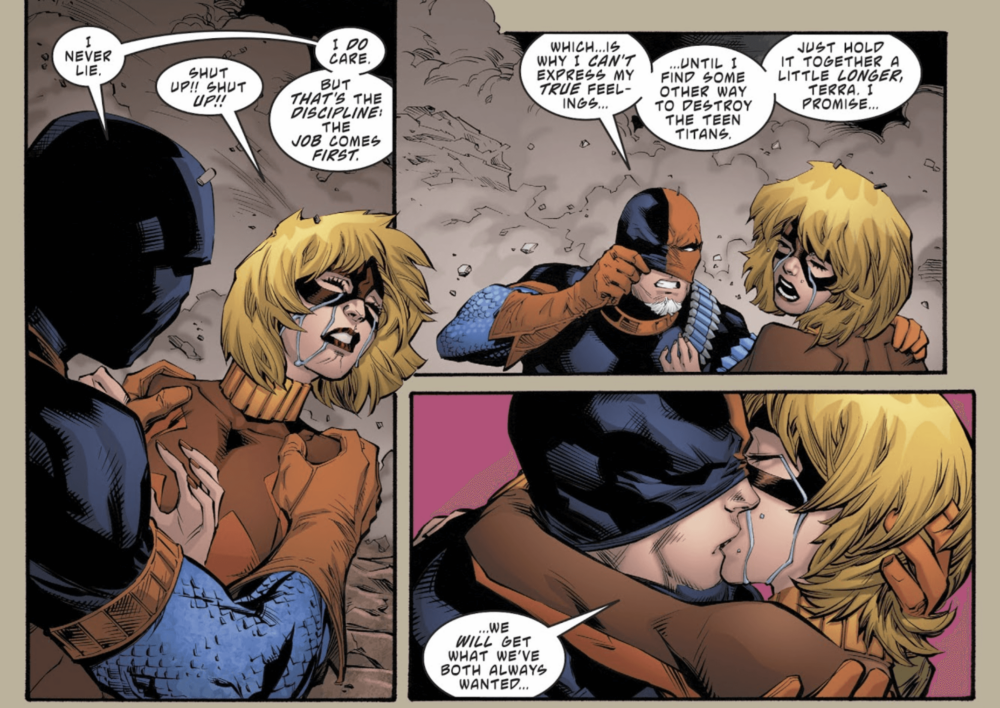
In a 2019 interview with Multiversity Comics, Priest explains that company censorship made it hard for him to explore Tara and Slade’s relationship to the extent which he intended. Because of Deathstroke’s heightened popularity and view by readers as a “badass” and a “man’s man,” acknowledging his pre-New 52 backstory as a canonical child molester introduces the possibility for an unintentional condoning of his actions. “I was frustrated by the insistence we round the edges off of [Slade and Tara’s relationship]. Mainly because, I promise, 90% of the fans already know the story and little kids don’t read Deathstroke. So who were we protecting? The company? The fans? Or were we protecting Deathstroke by shaving edges off of what he is—a reprehensible human being.” As Priest points out in his interview: Slade’s not a pedophile and Tara isn’t innocent. However, he’s still a child molester and she’s still a victim. Priest’s writing doesn’t change that.
DC has handled the emotional and sexual abuse of Tara Markov about as well as they’ve handled the experiences of several others characters, both in and outside of the Titans team specifically. On-screen rape in comics is always surrounded by controversy, but the domination of female characters as proof of an antagonist’s inherent evil has been an accepted trope in and outside of the genre for decades. To quote John Ridley in The Other History of the DC Universe, “Tara deserved more than what she got, and she deserved to be remembered as being better than the nature to which she succumbed. But history is written by the living. Not the dead.”

